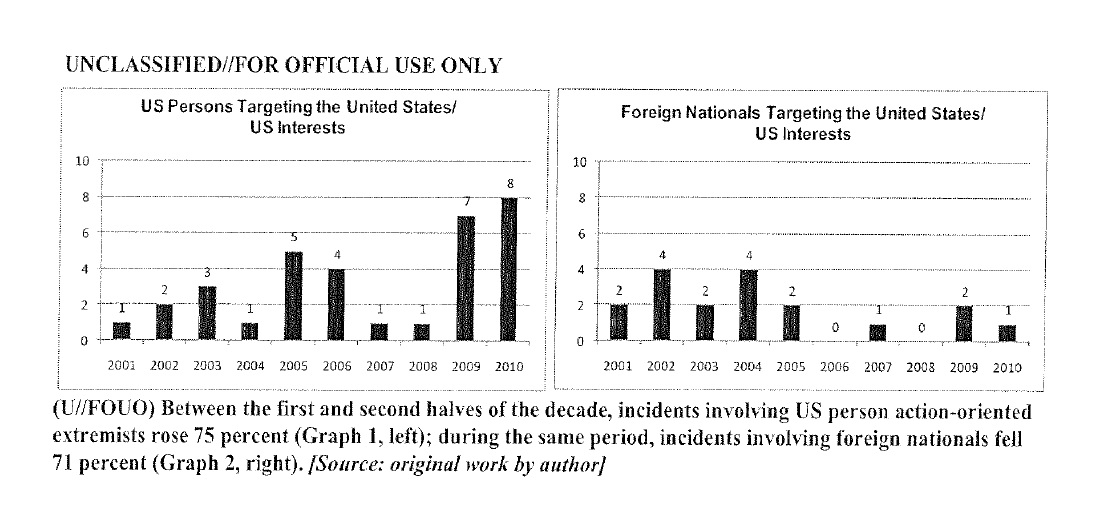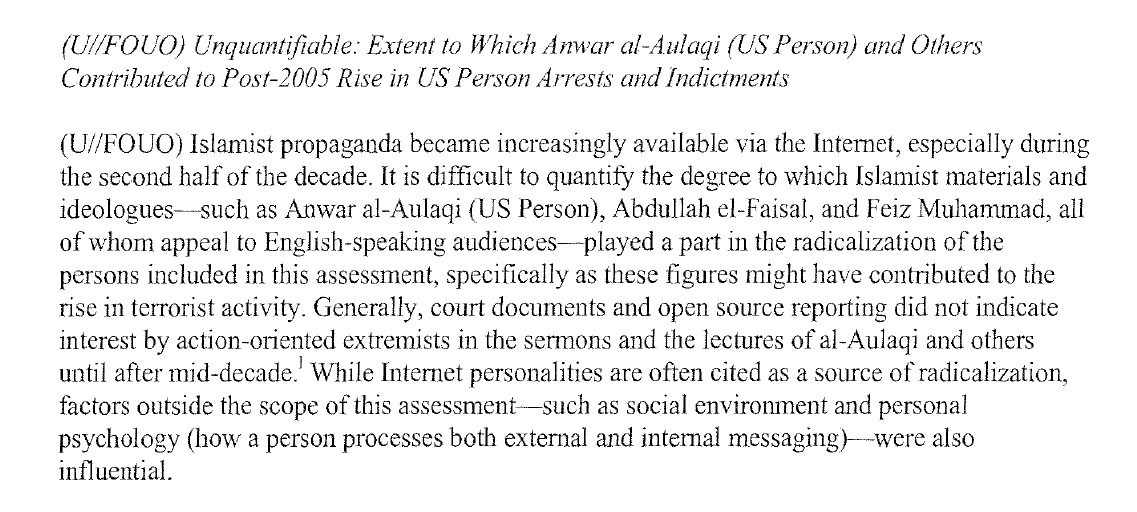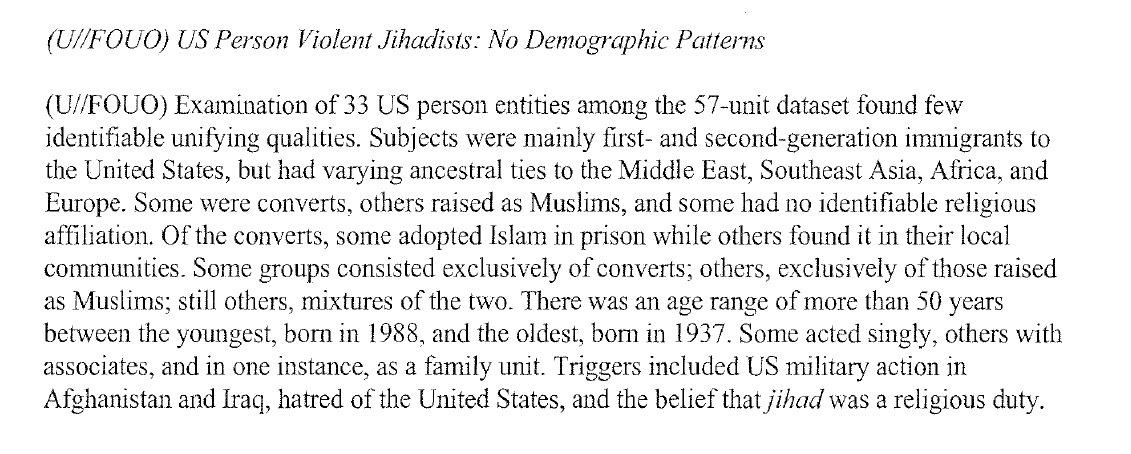It looks like you're using an Ad Blocker.
Please white-list or disable AboveTopSecret.com in your ad-blocking tool.
Thank you.
Some features of ATS will be disabled while you continue to use an ad-blocker.
17
share:
An Intelligence Assessment of terrorist plots against the United States and US interests between 2001 and 2010 concluded that “a broadening US military presence overseas and outreach by Islamist ideologues” was behind an 11 percent increase in plotted attacks since 2006.
Source
CVE Documents: Link
In 2011, the Los Angeles Division of the FBI and the Joint Regional Intelligence Center went back and analyzed 57 terrorist plots from 2001 to 2010.

The FBI and JRIC assessed “with high confidence” that Americans rather than foreign nationals were behind the 11 percent increase in terrorist plots since 2006. Foreign nationals “led anti-US targeting prior to 2006,” plotting 52 percent of all attacks, while U.S. persons and groups planned 70 percent of all attacks after 2006.

Before anybody says, “Islamic extremists don’t have to be foreign nationals to commit acts of violence against the US,” allow me to explain. The propaganda media works hard, convincing us to accept that a large number of religious extremists in the Middle East want to bring harm to America. This is entirely untrue and is mainly used to pacify those against our involvement overseas. The FBI and JRIC’s own data supports this.
The increase in plots by Americans was not the result of “a formal, face-to-face recruitment plan by foreign violent extremists” but largely due to “self-selection, sometimes passively influenced by Internet provocateurs.” The FBI and JRIC were not able to quantify the degree to which Islamist propaganda and ideologues such as Anwar al-Awlaki were influential in inspiring terrorist attacks against the United States.

Amongst the 33 Americans who plotted attacks, the Intelligence Assessment found “few identifiable unifying qualities.” More importantly, the group was sociologically and religiously diverse, including some with “no identifiable religious affiliation.” The article states that the FBI and JRIC’s Intelligence Assessment is consistent with the scholarly consensus, which also suggests that there is no single profile of terrorists.

Another analysis of thousands of leaked Islamic State documents by the Associated Press revealed that most of the group’s early recruits had only basic knowledge of Islam.
'Islam for Dummies': IS recruits have poor grasp of faith
According to the documents, which were acquired by the Syrian opposition site Zaman al-Wasl and shared with the AP, 70 percent of recruits were listed as having just "basic" knowledge of Shariah — the lowest possible choice. Around 24 percent were categorized as having an "intermediate" knowledge, with just 5 percent considered advanced students of Islam. Five recruits were listed as having memorized the Quran.
The FBI and JRIC were confident that “much of the activity stemmed from a perception that the United States is at war with Islam and jihad is the correct and obligatory response.”

It’s important to understand why the word “perception” is used, which signifies that our enemies have been conditioned to view America in the same manner that Americans have been conditioned to view Islam. A false war by design in order to subvert and control the population.
A 2004 report by the Defense Science Board Task Force stated that “American actions and the flow of events [since 9/11] have elevated the authority of the Jihadi insurgents and tended to ratify their legitimacy among Muslims.” Specifically, it blamed the “one-sided support in favor of Israel and against Palestinian rights,” U.S. support for “what Muslims collectively see as tyrannies,” and the U.S. occupation of Afghanistan and Iraq for “elevating the stature of and support for radical Islamists.”
Report: Download
Spy Agencies Say Iraq War Worsens Terrorism Threat
A stark assessment of terrorism trends by American intelligence agencies has found that the American invasion and occupation of Iraq has helped spawn a new generation of Islamic radicalism and that the overall terrorist threat has grown since the Sept. 11 attacks.
The classified National Intelligence Estimate attributes a more direct role to the Iraq war in fueling radicalism than that presented either in recent White House documents or in a report released Wednesday by the House Intelligence Committee, according to several officials in Washington involved in preparing the assessment or who have read the final document.
The intelligence estimate, completed in April, is the first formal appraisal of global terrorism by United States intelligence agencies since the Iraq war began, and represents a consensus view of the 16 disparate spy services inside government. Titled “Trends in Global Terrorism: Implications for the United States,’’ it asserts that Islamic radicalism, rather than being in retreat, has metastasized and spread across the globe.
This “perception” is not limited to those living overseas, but has spread to the US as well. It’s what causes specific citizens to develop the same hatred towards their own countries government, eventually convincing themselves to act regardless of religious affiliation.
This is the point.
Tolerant US citizens are becoming radicalized by the same “perception” that most Islamic State recruits have developed towards America. The ideology knows no border, but is contained by those willing to wield it. Because of this, the need to examine the public’s opinion and profile them based upon there level of trust and distaste for their government will decide how you are “processed in the future.
The Assessment raises uncomfortable questions for the Obama administration’s Countering Violent Extremism (CVE) programs. CVE initiatives are ostensibly aimed at reducing the threat of terrorism in the United States.
edit on 18-9-2016 by eisegesis because: (no reason
given)
Obama administration’s billion-dollar anti-terror strategy shrouded in secrecy
and distrust
This is NOT just about those relentless Islamic extremists, this is about you and I. The future potential terrorist. With help from the FBI and other organizations, the increase in homegrown terrorism has definitely served it’s purpose. We are not safer, only more secured.
The Radicalization Process: From Conversation to Jihad
Many researchers have tried to identify and explain the path to extremism, but the data has yet to correlate with there assumptions. There are just too many variables.
PDF: Download
Despite these shortfalls, Obama and the CVE’s initiatives remain determined to identify the difference between someone that does and does not decide to carry out a terrorist attack.

Blind to there own influence, focusing on America’s foreign policy and the effect it has on it’s citizens is a good place to start.
The CVE initiative does not address US foreign policy or how it contributes to extremism, but instead focuses on other “effective approaches to activism and political/social impact.” The same approaches that continue to fail while terrorism remains a threat.
The politics of fear: how Britain’s anti-extremism strategy has failed
I’m going to wrap this up by saying that our Middle East involvement has little to do with fighting extremism. The CVE and Obama’s other failed initiatives are deliberately designed to circumvent any discussion about changing US policy. It was designed to manage the perception of Muslims in the US attempting to speak out. Muslim communities have been asked to work closely with law enforcement and intelligence agencies in order to monitor and if needed, create a little "homegrown" terrorism.
In February of last year, the White House hosted a three-day summit on Countering Violent Extremism (CVE), bringing together community leaders, ministers representing seventy countries, civil society and private sector representatives, and officials from multilateral institutions such as the United Nations.
According to a White House factsheet, the purpose of the summit was to “discuss concrete steps the United States and its partners can take to develop community-oriented approaches to counter hateful extremist ideologies that radicalize, recruit or incite to violence.”
This is NOT just about those relentless Islamic extremists, this is about you and I. The future potential terrorist. With help from the FBI and other organizations, the increase in homegrown terrorism has definitely served it’s purpose. We are not safer, only more secured.
The Radicalization Process: From Conversation to Jihad
Many researchers have tried to identify and explain the path to extremism, but the data has yet to correlate with there assumptions. There are just too many variables.
PDF: Download
Despite these shortfalls, Obama and the CVE’s initiatives remain determined to identify the difference between someone that does and does not decide to carry out a terrorist attack.

Theories of radicalization are supposed to provide law enforcement and intelligence agencies with a method of identifying those most susceptible to becoming terrorists and intervening before an attack can be planned and executed. Proponents of CVE initiatives, however, have struggled to contend with the fact that these theories are scientifically dubious and simply cannot predict who is likely to become a terrorist.
Blind to there own influence, focusing on America’s foreign policy and the effect it has on it’s citizens is a good place to start.
As Tariq Ramadan, Professor of Contemporary Islamic Studies at Oxford University, recently wrote, “it’s clear that western policies in the Middle East have led to high levels of frustration and may well explain why some individuals have adopted extremist views.” CVE programs, he continued, are “almost entirely mute” on this subject.
The CVE initiative does not address US foreign policy or how it contributes to extremism, but instead focuses on other “effective approaches to activism and political/social impact.” The same approaches that continue to fail while terrorism remains a threat.
The politics of fear: how Britain’s anti-extremism strategy has failed
The British government, like its European and US counterparts, has been struggling to find an effective strategy to counter “radicalization” within Muslim communities. When programmes like Prevent were established, they quickly came under heavy criticism, both for their approach and for their poor results. Over a decade on, it is clear not a single anti-radicalisation scheme, either in Europe or the US, has proved effective.
I’m going to wrap this up by saying that our Middle East involvement has little to do with fighting extremism. The CVE and Obama’s other failed initiatives are deliberately designed to circumvent any discussion about changing US policy. It was designed to manage the perception of Muslims in the US attempting to speak out. Muslim communities have been asked to work closely with law enforcement and intelligence agencies in order to monitor and if needed, create a little "homegrown" terrorism.
edit on 18-9-2016 by eisegesis because: (no reason given)
Wait what...?
Next you're going to tell me the sky is blue and grass is green... I just can't believe it.
Next you're going to tell me the sky is blue and grass is green... I just can't believe it.
Terror attacks are the lined up dominos...
But foreign policy is the finger that pushes the first one over.
Doesn't justify it, but anyone who ignores it is just an ignoramus.
But foreign policy is the finger that pushes the first one over.
Doesn't justify it, but anyone who ignores it is just an ignoramus.
Like I've told lots of people. If a guy is walking around in my lawn with a gun and a different flag on his shoulder, he's got problems... So does his
country.
edit on 18-9-2016 by CriticalStinker because: (no reason given)
Which of the answers is correct ?
1) President Obama states they have been reducing military presence around the world since he took office
2) We are actually increasing military presence
Only one answer is correct.
1) President Obama states they have been reducing military presence around the world since he took office
2) We are actually increasing military presence
Only one answer is correct.
I blame Obama's monetary presents to terrrorists like pallets of cash to Iran.
a reply to: Deny Arrogance
Good call Deny, not to mention leaving a secure Iraq for ISIS to take over.
Good call Deny, not to mention leaving a secure Iraq for ISIS to take over.
new topics
-
More Bad News for Labour and Rachel Reeves Stole Christmas from Working Families
Regional Politics: 2 hours ago -
Light from Space Might Be Travelling Instantaneously
Space Exploration: 3 hours ago -
The MSM has the United Healthcare assassin all wrong.
General Conspiracies: 4 hours ago -
2025 Bingo Card
The Gray Area: 4 hours ago -
The Mystery Drones and Government Lies
Political Conspiracies: 6 hours ago
top topics
-
Pelosi injured in Luxembourg
Other Current Events: 13 hours ago, 18 flags -
The Mystery Drones and Government Lies
Political Conspiracies: 6 hours ago, 9 flags -
Nov 2024 - Former President Barack Hussein Obama Has Lost His Aura.
US Political Madness: 14 hours ago, 7 flags -
The MSM has the United Healthcare assassin all wrong.
General Conspiracies: 4 hours ago, 6 flags -
2025 Bingo Card
The Gray Area: 4 hours ago, 5 flags -
More Bad News for Labour and Rachel Reeves Stole Christmas from Working Families
Regional Politics: 2 hours ago, 5 flags -
Light from Space Might Be Travelling Instantaneously
Space Exploration: 3 hours ago, 3 flags
active topics
-
2025 Bingo Card
The Gray Area • 10 • : Oldcarpy2 -
The Mystery Drones and Government Lies
Political Conspiracies • 33 • : WeMustCare -
I See a Different Attitude This Time Around with Congress
US Political Madness • 32 • : interupt42 -
Something better
Dissecting Disinformation • 21 • : AgarthaSeed -
More Bad News for Labour and Rachel Reeves Stole Christmas from Working Families
Regional Politics • 2 • : Bluntone22 -
The MSM has the United Healthcare assassin all wrong.
General Conspiracies • 7 • : MauiWaui -
Pelosi injured in Luxembourg
Other Current Events • 25 • : WeMustCare -
Light from Space Might Be Travelling Instantaneously
Space Exploration • 14 • : CosmicFocus -
Statements of Intent from Incoming Trump Administration Members - 2025 to 2029.
2024 Elections • 43 • : WeMustCare -
-@TH3WH17ERABB17- -Q- ---TIME TO SHOW THE WORLD--- -Part- --44--
Dissecting Disinformation • 3676 • : duncanagain
17
